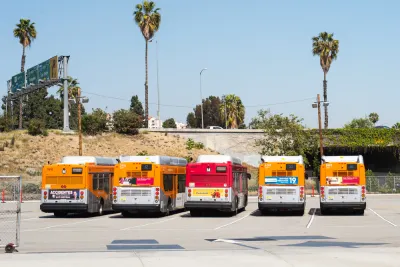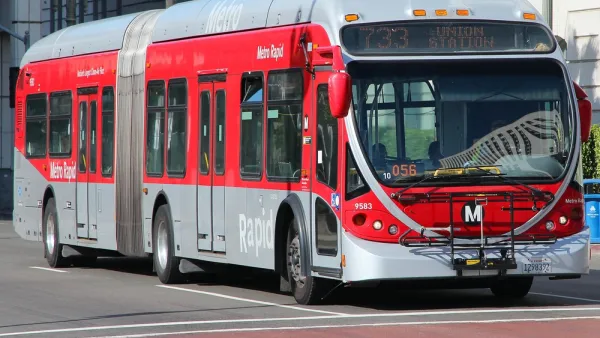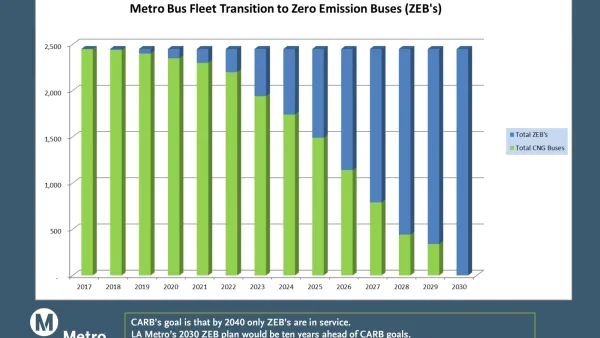At a June 22 meeting, the Los Angeles County Metropolitan Transportation Authority board ordered 295 buses that will be fueled with renewable natural gas. An expected purchase of 35 electric buses was delayed until next month's meeting.

"The Los Angeles County Metropolitan Transportation Authority (Metro) has voted to purchase 295 40-foot compressed natural gas buses, which will be fueled by renewable natural gas (RNG), according to the latest release from NGVAmerica," reports Lauren Tyler for NGT News. "The contract also includes an option for the purchase of 305 additional 40-foot CNG buses."
As noted in an earlier post, "Los Angeles Metro to Go Fully Electric by 2030," the board was also asked "to approve the purchase of 35 60-foot electric buses for the Orange Line — the goal remains to convert the Orange Line to fully electric buses by 2020 while also putting electric buses on the Silver Line."
According to an email from an electric bus advocate, that part of the bus procurement was held over due to concerns about the contract with Canada-based New Flyer.
Metro's bus fleet, second largest after New York's, is among the nation's cleanest, having converted from diesel fuel to cleaner-burning natural gas by 2011, fulfilling a 1993 commitment to clean air in the nation's smoggiest city.
However, new technology has significantly reduced emissions from older CNG engines, so "LA Metro will also begin retrofitting and replacing its buses with the new Cummins-Westport Low NOx CNG engines [aka "near-zero emissions"] that reduce smog-forming NOx and GHG emissions that are 90% lower than the U.S. Environmental Protection Agency NOx limit," according to the NGV (Natural Gas Vehicles for America) release. See Metro's October 2016 announcement on these near-zero emissions engine replacements.
“This engine gives our customers the most affordable path to zero-equivalent emissions and the benefits of performance and reliability described by California’s South Coast Air Quality Management District as equivalent to an electric vehicle,” said Rob Neitzke, president of Cummins Westport.
As noted in an April post, "Best Fuel to Power Buses: Renewable Natural Gas or Battery-Electric?" the use of renewable natural gas, derived from the decomposition of organic matter from sources such as landfills, anaerobic digesters and waste treatment plants, offers transit agencies an additional route toward zero emissions than relying solely on electric and fuel cell buses. [See compelling editorial that advocates for Metro using both alternatives, which appears to be the case.]
FULL STORY: LA Metro Approves Massive Order for 295 Renewable CNG Buses

National Parks Layoffs Will Cause Communities to Lose Billions
Thousands of essential park workers were laid off this week, just before the busy spring break season.

Retro-silient?: America’s First “Eco-burb,” The Woodlands Turns 50
A master-planned community north of Houston offers lessons on green infrastructure and resilient design, but falls short of its founder’s lofty affordability and walkability goals.

Delivering for America Plan Will Downgrade Mail Service in at Least 49.5 Percent of Zip Codes
Republican and Democrat lawmakers criticize the plan for its disproportionate negative impact on rural communities.

Test News Post 1
This is a summary

Test News Headline 46
Test for the image on the front page.

Balancing Bombs and Butterflies: How the National Guard Protects a Rare Species
The National Guard at Fort Indiantown Gap uses GIS technology and land management strategies to balance military training with conservation efforts, ensuring the survival of the rare eastern regal fritillary butterfly.
Urban Design for Planners 1: Software Tools
This six-course series explores essential urban design concepts using open source software and equips planners with the tools they need to participate fully in the urban design process.
Planning for Universal Design
Learn the tools for implementing Universal Design in planning regulations.
EMC Planning Group, Inc.
Planetizen
Planetizen
Mpact (formerly Rail~Volution)
Great Falls Development Authority, Inc.
HUDs Office of Policy Development and Research
NYU Wagner Graduate School of Public Service




























